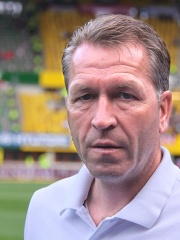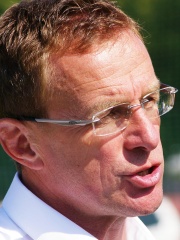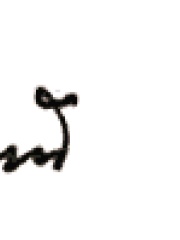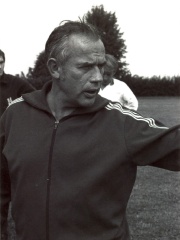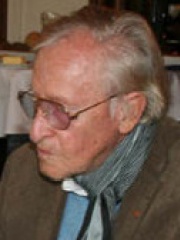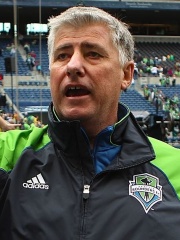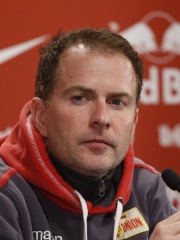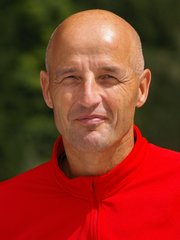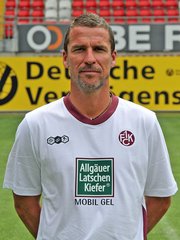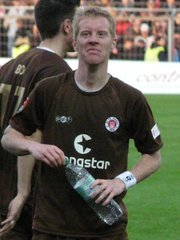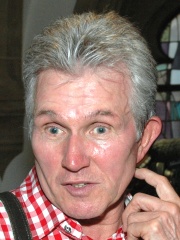
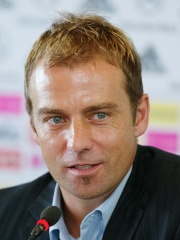
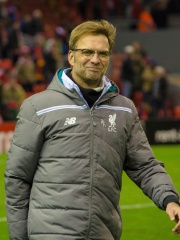
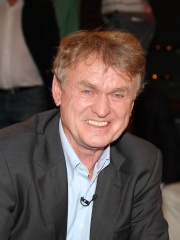
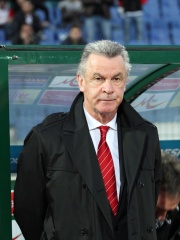
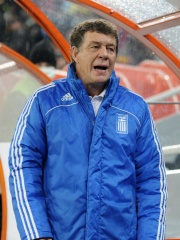
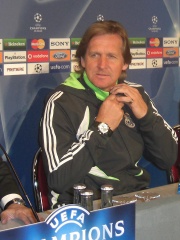
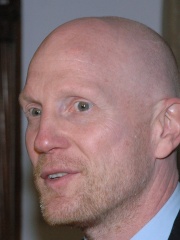
The Most Famous
COACHES from Germany
Top 10
The following people are considered by Pantheon to be the top 10 most legendary German Coaches of all time. This list of famous German Coaches is sorted by HPI (Historical Popularity Index), a metric that aggregates information on a biography's online popularity. Visit the rankings page to view the entire list of German Coaches.

1. Jupp Heynckes (b. 1945)
With an HPI of 76.94, Jupp Heynckes is the most famous German Coach. His biography has been translated into 54 different languages on wikipedia.
Josef "Jupp" Heynckes (German: [ˈjʊp ˈhaɪnkəs]; born 9 May 1945) is a German retired professional footballer and manager. For the majority of his playing career he was as a striker for Borussia Mönchengladbach in its golden era of the 1960s and '70s, when they won many national championships and the DFB-Pokal, as well as the UEFA Cup. During this period the team played in its only European Cup final in 1977, losing to Liverpool. He is the fourth-highest goalscorer in the history of the Bundesliga, with 220 goals. He was a member of the West Germany national team that won the UEFA Euro 1972 and the 1974 FIFA World Cup titles. As manager, Heynckes won four Bundesliga titles with Bayern Munich and two UEFA Champions Leagues; with Real Madrid in 1997–98 and Bayern in 2012–13, the latter of which was part of a continental treble. He is widely regarded as one of the greatest managers of all time.

2. Hans-Dieter Flick (b. 1965)
With an HPI of 75.42, Hans-Dieter Flick is the 2nd most famous German Coach. His biography has been translated into 49 different languages.
Hans-Dieter "Hansi" Flick (German pronunciation: [ˈhanzi ˈflɪk]; born 24 February 1965) is a German professional football manager and former player who is the manager of La Liga club Barcelona. Flick played for SV Sandhausen, Bayern Munich, and 1. FC Köln during his career as a footballer. He began his managerial career as player-manager of fourth-division club Victoria Bammental. In 2000, he became manager of fellow fourth-division side TSG 1899 Hoffenheim, leading the team to promotion to the Regionalliga Süd before leaving in 2005. From 2006 to 2014, Flick was the assistant coach of the German national team under Joachim Löw, contributing to their victory at the 2014 FIFA World Cup. He subsequently served as the sporting director of the German Football Association (DFB) from 2014 to 2017. Having rejoined Bayern Munich as an assistant coach in 2019, Flick was made interim manager following the departure of Niko Kovač in November 2019. He was later appointed permanently, and won the UEFA Champions League that season, completing the club's second continental treble. In 2021, he also led the side to a FIFA Club World Cup and another Bundesliga title. Alongside Pep Guardiola, and Luis Enrique they are the only managers to achieve a sextuple with their team. He later replaced Löw in charge of the Germany national team in 2021, leading the team to qualification for the 2022 FIFA World Cup, before being dismissed in 2023. In 2024, he joined Spanish club Barcelona, winning the Supercopa de España, Copa del Rey and La Liga in his debut season.

3. Jürgen Klopp (b. 1967)
With an HPI of 73.67, Jürgen Klopp is the 3rd most famous German Coach. His biography has been translated into 73 different languages.
Jürgen Norbert Klopp (German pronunciation: [ˈjʏʁɡn̩ ˈklɔp] ; born 16 June 1967) is a German football executive and former manager and player. He is widely regarded as one of the greatest managers of all time. Klopp has been Head of Global Soccer for Red Bull GmbH since January 2025. Klopp spent most of his playing career at Mainz 05. He was initially deployed as a striker, but was later moved to defence. Upon retiring in 2001, Klopp became the club's manager, and secured Bundesliga promotion in 2004. After suffering relegation in the 2006–07 season and unable to achieve promotion, Klopp resigned in 2008 as the club's longest-serving manager. He then became manager of Borussia Dortmund, guiding them to the Bundesliga title in 2010–11, before winning Dortmund's first-ever domestic double during a record-breaking season. Klopp also guided Dortmund to a runner-up finish in the 2012–13 UEFA Champions League before leaving in 2015 as their longest-serving manager. Klopp was appointed manager of Liverpool in 2015. He guided the club to UEFA Champions League finals in 2018 and 2022, and won the trophy in 2019 to secure his first – and Liverpool's sixth – title in the competition. Klopp's side finished second in the 2018–19 Premier League, registering 97 points; the then third-highest total in the history of the English top division, and the most by a team without winning the title. The following season, Klopp won the UEFA Super Cup and Liverpool's first FIFA Club World Cup, before delivering Liverpool's first Premier League title, amassing a club record 99 points and breaking a number of top-flight records. These achievements won him back-to-back FIFA Coach of the Year awards in 2019 and 2020. Klopp won a cup double of the EFL Cup and FA Cup in 2022. He won another EFL Cup in 2024, departing that same year. Klopp is a notable proponent of Gegenpressing, whereby the team, after losing possession, immediately attempts to win back possession, rather than falling back to regroup. He has described his sides as playing "heavy metal" football, in reference to their pressing and high attacking output. Klopp has cited his main influences as Italian coach Arrigo Sacchi, and former Mainz coach Wolfgang Frank. The importance of emotion is something Klopp has underlined throughout his managerial career, and he has gained both admiration and notoriety for his enthusiastic touchline celebrations.

4. Sepp Maier (b. 1944)
With an HPI of 73.14, Sepp Maier is the 4th most famous German Coach. His biography has been translated into 50 different languages.
Josef Dieter "Sepp" Maier (German pronunciation: [ˈjoːzɛf ˈdiːtɐ zɛp ˈmaɪɐ]; born 28 February 1944) is a German former professional footballer who played as a goalkeeper for Bayern Munich and the West Germany national team. Regarded as one of football's greatest goalkeepers, he was nicknamed "Die Katze von Anzing" ("the cat from Anzing") for his fast reflexes, agility, flexibility, speed, and consistency. With 709 matches played across seventeen seasons, he was Bayern's all-time record appearance holder, until he was surpassed by Thomas Müller in 2024. In addition to his shot-stopping ability, Maier was also known for his ability to dominate his box, as well as his sense of humour and personality throughout his career, which made him a fan favourite. Regarding his playing style, he once quipped "a keeper should give off a sense of calm, and not fall asleep while doing so."
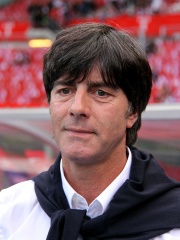
5. Joachim Löw (b. 1960)
With an HPI of 72.65, Joachim Löw is the 5th most famous German Coach. His biography has been translated into 72 different languages.
Joachim "Jogi" Löw (German pronunciation: [ˈjoːaxɪm ˈløːf]; born 3 February 1960) is a German football coach and former player. He was the manager of the Germany national team from 2006 until 2021. During his tenure as manager, he led Germany to victory at the 2014 FIFA World Cup in Brazil and the 2017 FIFA Confederations Cup in Russia. In March 2021, Löw announced that he would resign from his position after the delayed Euro 2020. Of all head coaches of the Germany national football team, Löw has managed and won the most matches (124/198).

6. Ottmar Hitzfeld (b. 1949)
With an HPI of 70.64, Ottmar Hitzfeld is the 6th most famous German Coach. His biography has been translated into 47 different languages.
Ottmar Hitzfeld (German pronunciation: [ˈʔɔtmaːɐ̯ ˈhɪt͡sfɛlt]; born 12 January 1949) is a German former professional football player and a former manager. He accumulated a total of 18 major titles, mostly in his tenures with Grasshopper Club Zürich, Borussia Dortmund and Bayern Munich. A striker in his playing days, Hitzfeld won two Swiss Super League titles (1971–72, 1972–73) with Basel. He was top goalscorer in the league for the 1972–73 season. He earned six caps for the West Germany national team, all at the 1972 Summer Olympics in Munich. A trained mathematician and sports teacher, Hitzfeld is one of the most successful coaches of German and international football. As manager, he won two Bundesliga titles with Dortmund and five Bundesliga titles with Bayern Munich. He won the 1996–97 Champions League with Dortmund, beating a star-studded Juventus team in the final. He won the 2000–01 Champions League with Bayern, defeating Valencia in the final. He has been elected "World Coach of the Year" twice; he is one of only seven managers to win the European Cup/UEFA Champions League with two clubs, along with Ernst Happel, Luis Enrique, Pep Guardiola, José Mourinho, Jupp Heynckes, and Carlo Ancelotti.

7. Otto Rehhagel (b. 1938)
With an HPI of 70.01, Otto Rehhagel is the 7th most famous German Coach. His biography has been translated into 40 different languages.
Otto Rehhagel (German: [ˈʁeːhaːɡl̩]; born 9 August 1938) is a German former football coach and player. Rehhagel is one of only two people who, as player and manager combined, has participated in over 1,000 Bundesliga matches (the other being Jupp Heynckes). In the Bundesliga, he holds the records for the most wins (387), most draws (205), most losses (228), and his teams scored the most goals (1,473) and conceded more (1,142) than any other. He served as the head coach of Werder Bremen between 1981 and 1995, winning the Bundesliga twice and in the Cup Winners' Cup in 1992, the club's only continental title so far. After a rather unsuccessful intermezzo at Bayern Munich, he sensationally won the Bundesliga with the promoted team 1. FC Kaiserslautern in 1998. Internationally, Rehhagel coached Greece from 2001 to 2010 in their most successful footballing era—during that period, Greece unexpectedly won the 2004 European Championship and qualified for the 2010 World Cup, their only second World Cup finals appearance. A 2022 critically acclaimed film entitled King Otto was made on Rehhagel's triumph with the Greece national team in the 2004 European Championship.

8. Bernd Schuster (b. 1959)
With an HPI of 69.30, Bernd Schuster is the 8th most famous German Coach. His biography has been translated into 45 different languages.
Bernd Schuster (born 22 December 1959) is a German former professional footballer of the late 1970s through early 1990s, who won club titles playing for the Spanish sides Barcelona (1980–1988) and Real Madrid (1988–1990). He played as a midfielder and was nicknamed "der Blonde Engel" (the Blond Angel). After retiring as a player, he managed a number of European clubs, including Real Madrid, taking them to the league title in the 2007–08 season.

9. Matthias Sammer (b. 1967)
With an HPI of 65.76, Matthias Sammer is the 9th most famous German Coach. His biography has been translated into 47 different languages.
Matthias Sammer (German pronunciation: [maˈtiːas ˈzamɐ]; born 5 September 1967) is a German football official and former player and coach. He played as a defensive midfielder and later in his career as a sweeper. With Borussia Dortmund as a player, Sammer won the Bundesliga and DFB-Supercup in 1995, the Bundesliga, DFB-Supercup, and European Footballer of the Year in 1996, and the UEFA Champions League and Intercontinental Cup in 1997. Germany won the UEFA Euro 1996 with Sammer as a player, where he was named the tournament's best player, and was subsequently awarded the Ballon d'Or later that year. Sammer retired with 74 total caps, 23 for East Germany and 51 for the unified side. Known for his exceptional defensive skills, including his ability to read the game, make interceptions, and tackle effectively, Sammer is regarded as one of the greatest defenders of all time. With Sammer as a manager, Borussia Dortmund won the Bundesliga in 2002.
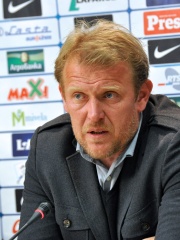
10. Robert Prosinečki (b. 1969)
With an HPI of 64.94, Robert Prosinečki is the 10th most famous German Coach. His biography has been translated into 45 different languages.
Robert Prosinečki (Croatian pronunciation: [rǒbert prosinětʃkiː];; born 12 January 1969) is a professional football manager and former player who played as a midfielder. Born in West Germany, he represented Yugoslavia and later Croatia at international level. He is currently manager of the Kyrgyzstan national team. Prosinečki began his senior career at Red Star Belgrade, winning three Yugoslav First League titles and the European Cup in 1991. He later played in Spain for Real Madrid, Barcelona, Oviedo and Sevilla. He subsequently won three Croatian league titles with Dinamo Zagreb, and also played in Belgium, England and Slovenia. At international level, Prosinečki was named best player of the tournament as Yugoslavia won the 1987 FIFA World Youth Championship, and finished runner-up with the under-21 side at the 1990 European Championship. He was also voted Best Young Player at the 1990 FIFA World Cup. For Croatia, he won 49 caps between 1994 and 2002, featuring at UEFA Euro 1996 and the World Cups of 1998 and 2002, and helping the team to third place in 1998. After retiring, Prosinečki served as assistant manager of the Croatia national team from 2006 to 2010 before being appointed manager of Red Star Belgrade in December 2010. He left in 2012 and, two months later, took charge of Turkish club Kayserispor. At international level, he coached the Azerbaijan national team from 2014 to 2017 and Bosnia and Herzegovina from 2018 to 2019. He later returned to manage Kayserispor and also coached Denizlispor, Olimpija Ljubljana and Rudeš.
People
Pantheon has 52 people classified as German coaches born between 1892 and 1988. Of these 52, 44 (84.62%) of them are still alive today. The most famous living German coaches include Jupp Heynckes, Hans-Dieter Flick, and Jürgen Klopp. The most famous deceased German coaches include Edmund Conen, Hennes Weisweiler, and Otto Nerz. As of April 2024, 3 new German coaches have been added to Pantheon including Peter Zeidler, Marco Kurz, and Timo Schultz.
Living German Coaches
Go to all RankingsJupp Heynckes
1945 - Present
HPI: 76.94
Hans-Dieter Flick
1965 - Present
HPI: 75.42
Jürgen Klopp
1967 - Present
HPI: 73.67
Sepp Maier
1944 - Present
HPI: 73.14
Joachim Löw
1960 - Present
HPI: 72.65
Ottmar Hitzfeld
1949 - Present
HPI: 70.64
Otto Rehhagel
1938 - Present
HPI: 70.01
Bernd Schuster
1959 - Present
HPI: 69.30
Matthias Sammer
1967 - Present
HPI: 65.76
Robert Prosinečki
1969 - Present
HPI: 64.94
Andreas Köpke
1962 - Present
HPI: 64.56
Ralf Rangnick
1958 - Present
HPI: 64.36
Deceased German Coaches
Go to all RankingsEdmund Conen
1914 - 1990
HPI: 64.77
Hennes Weisweiler
1919 - 1983
HPI: 61.78
Otto Nerz
1892 - 1949
HPI: 61.18
Rudi Gutendorf
1926 - 2019
HPI: 59.63
Fritz Buchloh
1909 - 1998
HPI: 58.75
Willi Multhaup
1903 - 1982
HPI: 52.58
Sigi Schmid
1953 - 2018
HPI: 49.86
Sascha Lewandowski
1971 - 2016
HPI: 44.96
Newly Added German Coaches (2025)
Go to all RankingsPeter Zeidler
1962 - Present
HPI: 50.95
Marco Kurz
1969 - Present
HPI: 42.02
Timo Schultz
1977 - Present
HPI: 41.65
Overlapping Lives
Which Coaches were alive at the same time? This visualization shows the lifespans of the 8 most globally memorable Coaches since 1700.

